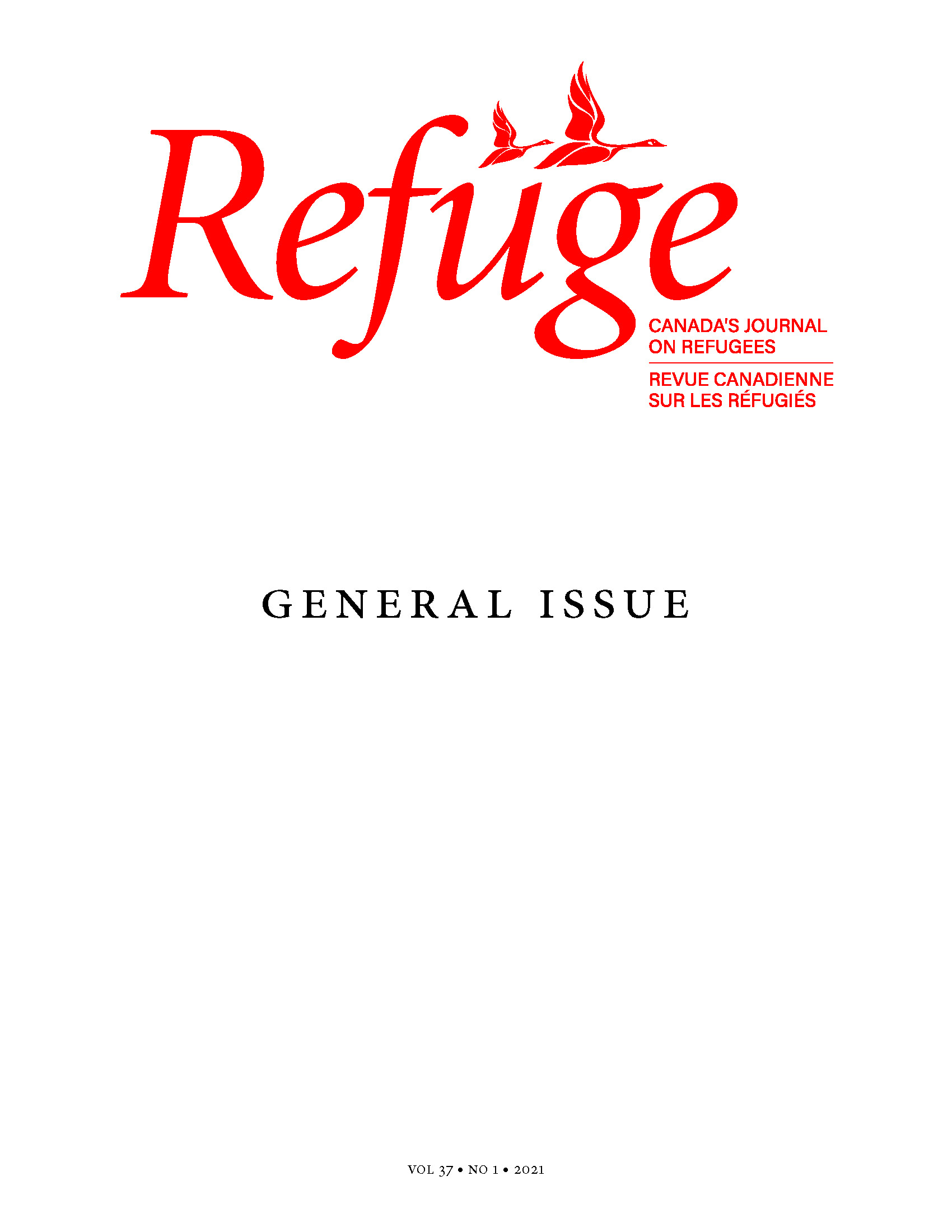'I Want to Give Something Back': Social Support and Reciprocity in the Lives of Young Refugees
DOI:
https://doi.org/10.25071/1920-7336.40690Keywords:
Germany, Syrian refugees, young people, support, reciprocity, coping strategyAbstract
This article analyzes the support relationships of 10 asylum-seeking young people who fled to Germany between 2010 and 2015. It highlights their wish for reciprocity as a need in their country of destination and expands upon Sahlin’s typology of reciprocal relationships (generalized, balanced, and negative reciprocity) by the type of “refused reciprocity.” “Refused reciprocity” occurs when people are keen to reciprocate for support they have received, but they live in environments that restrict their agency. The article argues that participation means not only provision of support, but creation of opportunities for people to experience themselves as self-effective actors. They become self-effective when they can cope successfully with new and difficult situations on their own.
Metrics
References
Barnes, D. M., & Aguilar, R. (2007). Community social support for Cuban refugees in Texas. Qualitative Health Research, 17(2), 225–237. https://doi.org/10.1177/1049732306297756
Blau, P. M. ([1968] 2005). Sozialer Austausch. In F. Adloff & S. Mau (Eds.), Vom Geben und Nehmen. Zur Soziologie der Reziprozität (pp. 125–137). Campus.
Bowling, N. A., Beehr, Terry A., & Swader, W. M. (2005). Giving and receiving social support at work: The roles of personality and reciprocity. Journal of Vocational Behavior, 67, 476–489. https://doi.org/10.1016/j.jvb.2004.08.004
Breithecker, R., & Stöckinger, M. (2020). Ist Geben seliger als Nehmen? Die Bedeutung von Gaben und Gegengaben in den Beziehungen von bürgerschaftlich engagierten und geflüchteten Menschen. In A. Schulz & T. Schwertel, (Eds.), Der lange Sommer der Flucht – 2015 und danach (pp. 73–97). Barbara Budrich.
Brown, S. L., Nesse, R. M., Vinokur, A. D., & Smith, D. M. (2003). Providing social support may be more beneficial than receiving it. Psychological Science, 14(4), 320–327. https://doi.org/10.1111/1467–9280.14461
Bundesamt für Migration und Flucht (BAMF). (2019). Aktuelle Zahlen. March 2019. https://www.bamf.de/SiteGlobals/Forms/Suche/Expertensuche_Flyout_Formular.html?templateQueryString=2Aktuelle+Zahlen+zu+Asyl2&sortOrder=dateOfIssue_dt+desc&pageLocale=de
Dunbar, M., Ford, G., &, Hunt, K. (1998). Why is the receipt of social support associated with increased psychological distress? Psychology & Health, 13(3), 527–544. https://doi.org/10.1080/08870449808407308
Gouldner, A. W. (1960). The norm of reciprocity: A preliminary statement. American Sociological Review, 25(2), 161–178. https://www.jstor.org/stable/2092623
Gouldner, A. W. ([1984] 2005). Etwas gegen nichts. Reziprozität und Asymmetrie. In F. Adloff & S. Mau (Eds.), Vom Geben und Nehmen. Zur Soziologie der Reziprozität (pp. 109–123). Campus.
Hamann, U., & Karakayali, S. (2016): Practicing Willkommenskultur: Migration and solidarity in Germany. Intersections, 2(4), 69–86. https://doi.org/10.17356/ieejsp.v2i4.296
Institute of Research in Social Pedagogy Mainz (ism). (2019). Entwicklung der jugendhilferechtlichen Zuständigkeit für umA im bundesweiten und rheinland-pfälzischen Vergleich. https://b-umf.de/src/wp-content/uploads/2019/02/2019_01_03_uma-meldung.pdf
Jung, J. (1990). The role of reciprocity in social support. Basic and Applied Social Psychology, 11(3), 243–253. https://doi.org/10.1207/s15324834basp1103_2
Kohli, R. K. S. (2011). Working to ensure safety, belonging and success for unaccompanied asylum-seeking children. Child Abuse Review, 20, 311–323. https://doi.org/10.1002/car.1182
Maiter, S., Simich, L., Jacobson, N., & Wise, J. (2008). Reciprocity: An ethic for community-based participatory action research. Action Research, 6(3), 305–325. http://dx.doi.org/10.1177/1476750307083720
Mauss, M. ([1968] 2005). Die Gabe. In F. Adloff & S. Mau (Eds.), Vom Geben und Nehmen. Zur Soziologie der Reziprozität (pp. 61–72). Campus.
Nelson, M. K. (2000). Single mothers and social support: The commitment to, and retreat from, reciprocity. Qualitative Sociology, 23(3), 291–317.
Neufeld, A., & Harrison, M. J. (1995). Reciprocity and social support in caregivers’ relationships: Variations and consequences. Qualitative Health Research, 5(3), 348–365. https://doi.org/10.1177/104973239500500306
Przyborski, A., & Wohlrab-Sahr, M. (2010). Qualitative Sozialforschung (3rd ed.). Oldenbourg.
Sahlin, M. D. ([1965] 1999). Zur Soziologie des primitiven Tauschs. Berliner Journal für Soziologie, 9(2), 149–178. Shumaker, S. A., & Brownell, A. (1984). Toward a theory of social support: Closing conceptual gaps. Journal of Social Issues, 40(4), 11–36. http://dx.doi.org/10.1111/j.1540–4560.1984.tb01105.x
Siim, B., Saarinen A., & Krasteva A. (2019). Citizens’ activism and solidarity movements in contemporary Europe: Contending with populism. In B. Siim, A. Krasteva, & A. Saarinen (Eds.), Citizens’ Activism and Solidarity Movements (pp. 1–24). Palgrave Macmillan.
Simmel, G. ([1908] 2005). Exkurs über Treue und Dankbarkeit. In F. Adloff & S. Mau (Eds.), Vom Geben und Nehmen. Zur Soziologie der Reziprozität (pp. 95–108). Campus.
Smith, A. (2016). “They have become my family”: Reciprocity and responsiveness in a volunteer-led proram for refugees in migrants. ArtsPraxis, 3, 71–86.
Stegbauer, C. (2011). Reziprozität. Einführung in soziale Formen der Gegenseitigkeit (2nd ed.). Verlag für Sozialwissenschaften (VS).
Stewart, M., Anderson, J., Beiser, M., Mwakarimba, E., Neufeld, A., Simich, L., & Spitzer, D. (2008). Multicultural meanings of social support among immigrants and refugees. International Migration, 46(3), 123–159. https://doi.org/10.1111/j.14682435.2008.00464.x
Strauss, A., & Corbin, J. (1996). Grounded Theory. Beltz. Takizawa, T., Kondo, T., Sakihara, S., Ariizumi, M., Watanabe, N., & Oyama, H. (2006). Stress buffering effects of social support on depressive symptoms in middle age: Reciprocity and community mental health. Psychiatry and Clinical Neurosciences, 60, 652–661. https://doi.org/10.1111/j.1440–1819.2006.01579.x
UNHCR (2020). Figures at a glance. https://www.unhcr.org/figures-at-a-glance.html
Väänänen, A., Buunk, B. P., Kivimäki, M., Pentti, J., & Vahtera, J. (2005). When it is better to give than to receive: Long- term health effects of perceived reciprocity in support exchange. Journal of Personality and Social Psychology, 89(2), 176–193. https://doi.org/10.1037/0022-3514.89.2.176
Wellmann, B., & Wortley, S. (1990). Different strokes from different folks: Community ties and social support. American Journal of Sociology, 96(3), 558–588. http://dx-.doi.org/10.1086/229572
Williams, H. (1995). There are no free gifts! Social support and the need for reciprocity. Human Organization, 54(4), 401–409. https://doi.org/10.17730/humo.54.4.w233493122q420v7
Downloads
Published
Versions
- 2021-04-26 (2)
- 2021-04-18 (1)
How to Cite
Issue
Section
License
Copyright (c) 2021 Caroline Schmitt

This work is licensed under a Creative Commons Attribution-NonCommercial 4.0 International License.
Refuge authors retain the copyright over their work, and license it to the general public under the Creative Commons Attribution-Non Commercial License International (CC BY-NC 4.0). This license allows for non-commercial use, reproduction and adaption of the material in any medium or format, with proper attribution. For general information on Creative Commons licences, visit the Creative Commons site. For the CC BY-NC 4.0 license, review the human readable summary.







